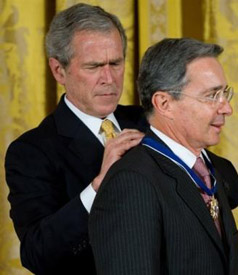Argentina Responds to CIA's Economic Lies

Washington Post:
The first Economic Intelligence Briefing report was presented to the White House yesterday by the CIA, the agency's new director, Leon Panetta, revealed at a news conference. The addition of economic news to the daily roundup of terrorist attacks and surveillance reports appears to reflect a growing belief among intelligence officials that the economic meltdown is now preeminent among security threats facing the United States....
...The spy agency is following worrisome trends in many corners of the globe, from East Asia to Latin America. In private meetings yesterday, Latin American intelligence officials warned their U.S. counterparts of a crisis spreading throughout the hemisphere, particularly in Argentina, Ecuador and Venezuela, Panetta said.
This is unacceptable. Given the US' primary role in creating this crisis and the incompetence we see here, the CIA ought to leave economics alone. We know the CIA's job in the region is to discredit the dominant left-wing tide, but they are supposed to be more covert than allowing their Director to spew in front of reporters. Argentina, Venezuela and Ecuador are rightly pissed. Argentina has taken the lead in responding.
(Argentina's) Foreign Minister Jorge Taiana called the comments made on Wednesday by CIA Director Leon Panetta "unfounded and irresponsible, especially from an agency that has a sad history of meddling in the affairs of countries in the region."
The US Ambassador to Argentina unfortunately has responded by insulting everyone's intelligence insisting we all simply misinterpreted what we know we heard very plainly. We heard very serious lies and defamations - product of the same Imperialist wishful thinking that infects the media and our host.
We can see the fallacy by looking at one of the most easily comparable and important economic metrics - industrial production. Only one major country in LA registered growth in January - Venezuela (at 2.4%). On the opposite end, Brazil went through the floor (-12.4%). Colombia followed with a 9.6% decline. Mexico has dropped for 8 months and fell 6.7% in January. Their GDP is already in the red and they are burning billions of dollars to prop up the peso.... here is a realistic regional economic portrait.
Labels: argentina, imperialism




